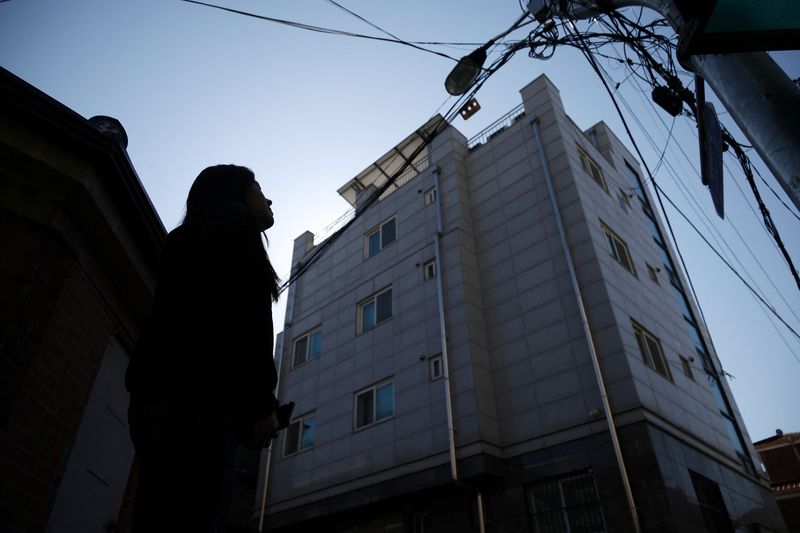By Jihoon Lee
SEOUL (Reuters) - A downturn in South Korea's home prices is causing pain in the country's unusual rent-free rental system that benefited landlords and tenants alike during a long surge in residential property prices.
In the "jeonse" scheme, tenants put up a deposit typically worth as much as 70% of the home's value, then live without paying rent for two years until the landlord returns the full amount.
This was a win-win for residents and owners for years as home prices rose and interest rates were high: the loan tenants paid to raise their deposit was cheaper than rent and landlords got an interest-free loan to deploy as they pleased.
Jeonse tenancy has been particularly popular among people in their 20s and 30s, who could not afford the full price of a home but could use the system to get a toehold into the Korean dream of home ownership.
But median house prices have fallen 12% and jeonse prices 7% over the two years to January after surging 37% and 24%, respectively, over the preceding four years, according to Korea Real Estate Board data.
'THOUGHT I WOULD BE JUST FINE'
Overextended landlords are failing to return deposits, hitting younger tenants especially hard and threatening to undermine trust in the system.
Yoo Ha-jin, 28, regrets not getting insurance for her jeonse deposit when she signed in March 2021. Her bankrupt landlord told her in December the property would be auctioned and she could expect to get around 45% of her deposit back at most.
That means she will owe at least 33 million won ($25,000) for the loan she took out on her jeonse contract expiring next month.
"I thought I would be just fine as long as I could get a jeonse deposit loan from the bank," Yoo told Reuters.
Insurance claims for failed jeonse repayments more than doubled last year to a record 1.17 trillion won ($903 million), according to Korea Housing and Urban Guarantee Corp, one of the country's three major guarantors.
Tenants in their 20s and 30s accounted for 70% of the total.
Financial authorities are working closely with other agencies to support jeonse tenants and landlords having difficulty with refunds, said an official at the Financial Services Commission.
Police are cracking down on jeonse-related crimes, saying organised fraud cases more than tripled last year to 622.
Jeonse deposit loans more than quadrupled in less than six years through October to 172 trillion won ($132 billion), according to the central bank. That equals 17% of South Korea's outstanding mortgages and 10% of household debt.
PROPERTY FALLOUT
Still, almost all jeonse loans have guarantees from public enterprises, leaving little credit risk for commercial lenders.
"The jeonse crisis poses limited macroeconomic risks, yet it is still another part of the whole property market fallout," said economist Moon Hong-cheol at DB Financial Investment.
Unexpected debt burdens on young people could exacerbate risks for the property market, a key sector that drives growth and affects financial markets. Fears of defaults on real estate projects last year triggered a credit crunch in South Korea's financial markets.
Some investment banks, such as Nomura and Citi, predict the Bank of Korea will start cutting interest rates as soon as the next three to six months to engineer a soft landing for the property market.

"It is frustrating there is really no one to blame," said Yoo, the stranded jeonse tenant. "I just think maybe I could have avoided this kind of trouble, had I had enough money to purchase my own house."
($1 = 1,295.8700 won)